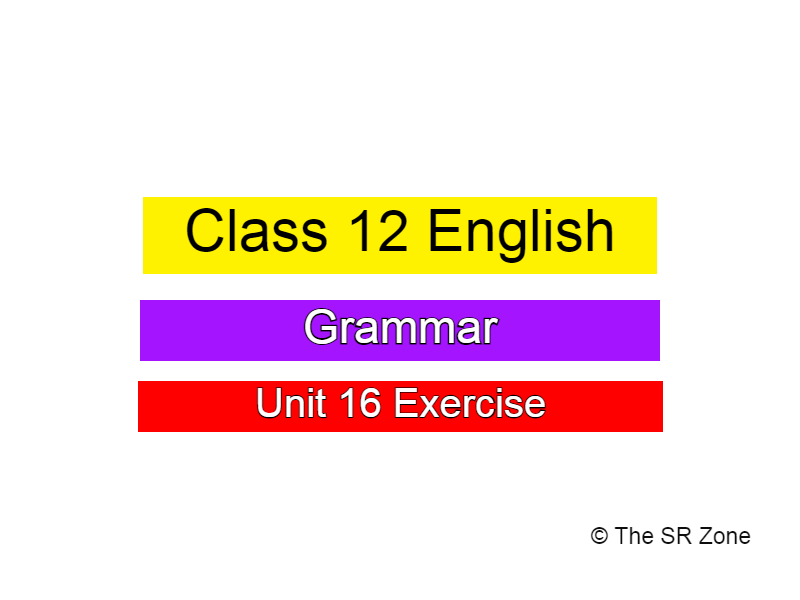Relative Clause Exercise - Class 12 English Grammar Unit 16
Unit 16 Grammar
Relative clauses are the things in grammar that describe or give more information about a noun or pronoun in a sentence. They are introduced by relative pronouns like who, whom, whose, which, or that or relative adverbs such as where, when, or why.
Clauses introduced by relative pronouns (who, that, which, what, as, but) are called relative clauses ( six in number). Adjectives are often used to specify or explain the word that comes before them.
Functions:
1. It serves as the object of the verb
2. Functioning as the subject of the verb
3. Functioning as the noun in a prepositional phrase.
There are two types of relative clauses: defining and non-defining.
Among these, defining relative clauses provide information about the noun or pronoun they modify, while non-defining relative clauses provide additional, nonessential information.
Here's an example of a defining relative clause:
"The movie that I watched last night was really interesting."
In this sentence, the relative clause "that I watched last night" defines which movie is being referred to. Without this information, the sentence would be incomplete and unclear.
And here's an example of a non-defining relative clause:
"My sister, who lives in Paris, is visiting me this week."
In this sentence, the relative clause "who lives in Paris" provides additional information about the speaker's sister, but it's not necessary to understand who the sister is. If the clause was removed, the sentence would still make sense and be complete.
As a rule of thumb, defining clauses should include commas while non-defining clauses should not.
Relative Clause
B. Fill in the blanks with suitable relative pronouns: who, which, that, whom, whose, where, why, how, what or when.
a. There is a lady .......... Wallet has been stolen. -Whose
b. Do you know the man .....sold these glasses? -who
C. The knife . ....you cut the bread with is very sharp. -which
d. Why do you blame him for everything ....-goes wrong? -that
e. A cemetery is a place..............dead bodies are buried. where
f. This school is for those children..........mother tongue is not Nepali. -whose
g. I don't know the name of the person...............I spoke over the telephone. -whom
h. I came to Kathmandu on the day................the devastating earthquake took place. - when
i. In the application form she wrote..............she needed a good payment. -when
l. The pilot explained............. he made a forced landing on the road. -why
C. Join the following pairs of sentences using who, which, that, whose, whom, where, when or what.
a. (The building was destroyed in the fire. It has now been rebuilt.
- The building, which was destroyed in the fire, has now been rebuilt.
b. A new cricket stadium is being made in Chitwan. It can accommodate one hundred thousand people.
- A new cricket stadium which can accommodate one hundred thousand people is being made in Chitwan.
c. Shanghai is the most populated city in the world. I stayed there for five years.
-Shanghai, where I stayed for five years, is the most populated city in the world.
d. This is the man. I gave some money to him this morning.
-This is the man whom I gave some money to this morning.
e. Do you know the man? His son was awarded in the school yesterday.
- Do you know the man whose son was awarded in the school yesterday?
f. His step-mother was not very kind to him. He had been staying with her.
- His step-mother, whom he had been staying with, was not very kind to him.
g. He can never forget Nakkhu Jail. He had spent 14 years there.
- He can never forget Nakkhu Jail where he had spent 14 years.
h. He showed me his new tab. He had paid a hundred thousand rupees for it.
-He showed me his new tab which he had paid a hundred thousand rupees for.
i. Nelson Mandela joined the ANC in the 1930s. He was a student then.
- Nelson Mandela joined the ANC in the 1930s when he was a student.
j. She forgot to buy the things. Her mother had told to buy them.
-She forgot to buy the things which her mother had told to buy.
